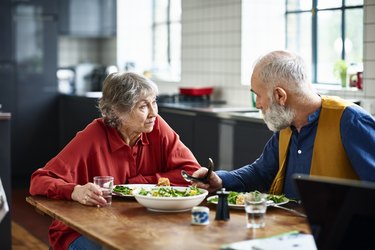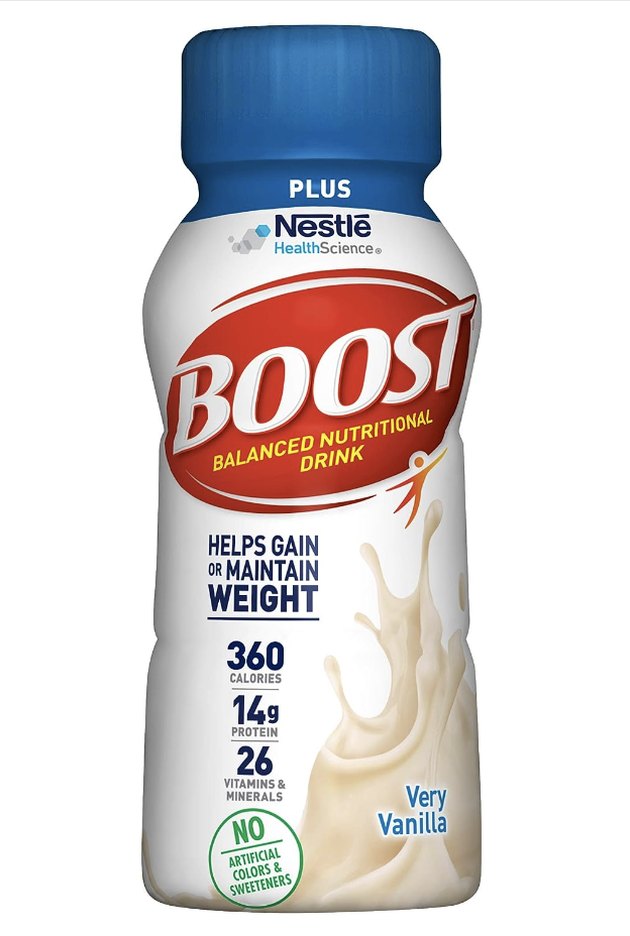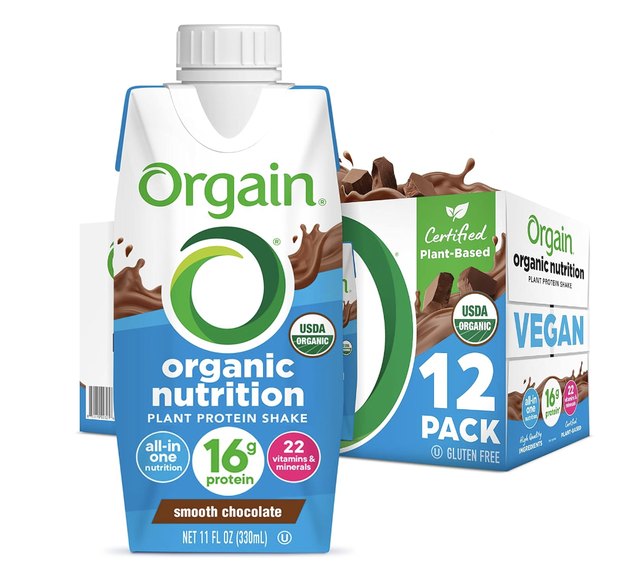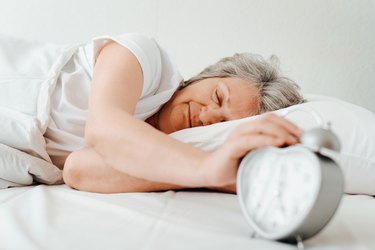
When you were younger, you'd always polish off the food on your plate, and you'd never dream of trading a good meal for something like cereal or plain toast. But as you've gotten older, your appetite just isn't what it used to be.
While it's not uncommon for older folks to cut back on portions or reach for simpler foods as they age, a loss of appetite can also stem from an underlying issue. And if it goes unaddressed, it could lead to weight loss and other problems like osteoporosis, anemia or trouble bouncing back from an illness or infection, according to the National Institute on Aging (NIA).
Video of the Day
Video of the Day
"A proper diet is essential for older adults because it helps them retain energy and reduces their risk of developing chronic diseases," says Diana Kerwin, MD, a geriatrics medicine physician at Texas Health Presbyterian Hospital Dallas.
Here, learn the reasons why you or a loved one is less interested in food than before and what you can do to stimulate appetite as you age.
It's not uncommon for your appetite to shrink as you get older, Dr. Kerwin says. That's because your sense of smell and taste diminish as you age, which can make food less appealing.
And if you're less active than you used to be, you may not need as much energy to stay fueled compared to when you were younger, according to a June 2020 review in Nursing and Older People.
2. Dental Issues
Dental issues become more common as you age, and problems with your teeth or gums can make eating less enjoyable, per the American Dental Association.
Things like tooth loss or poor-fitting dentures can make it harder to chew, while untreated cavities or gum disease might make chewing painful.
As you age, your living situation may change. You may have fewer people in your household to cook for, or you may live alone and eat by yourself.
Unfortunately, you're nearly twice as likely to have a poor appetite if you live alone, according to a January 2022 Nutrients study.
These changing social circumstances can increase loneliness, which may dampen your appetite. Plus, if you're depressed (from spending time by yourself), you may have a smaller appetite, too, per January 2022 research in Appetite.
4. Colds or Other Infections
Your immunity can decline with age, making you more susceptible to colds and infections, per the National Library of Medicine. When you're sick, anything other than a bit of soup or bites of toast usually isn't too appealing.
This is especially true if your illness also causes you to become dehydrated, Dr. Kerwin says.
5. Cognitive Decline
Cognitive decline, especially found in dementia and Alzheimer's disease, can increase your risk of depression, which often leads to weight loss and less interest in food, according to June 2015 findings in the International Journal of Geriatric Psychiatry.
Eating regular meals can also be challenging in other ways for people with Alzheimer's. They might be overwhelmed by too many food choices or have trouble focusing on food if the surrounding environment is hectic.
Plus, as a person's Alzheimer's gets worse, they may forget to eat or stop recognizing food altogether, per the Alzheimer's Association.
6. Chronic Diseases and Medications
Many chronic health issues that are common in old age — like chronic pain, heart failure, COPD, kidney failure, liver disease and cancer — can decrease your appetite. Additionally, conditions like Parkinson's disease or severe arthritis can also affect your ability to hold utensils, making it harder to eat, notes the Nursing and Older People review.
Medications prescribed to treat these conditions can also affect appetite, too, Dr. Kerwin says. Some medications can change the way food tastes, cause dry mouth or simply make you less hungry, she adds.
Some of the most common medications that cause appetite loss include the following, per the Cleveland Clinic:
- Antibiotics
- Digoxin, a heart failure drug
- Fluoxetine, an antidepressant
- Hydralazine, which treats high blood pressure
- Opioids, for chronic pain
Warning
Talk to your doctor before stopping a medication that decreases your appetite. They can work with you to either change your dose, find a similar medication that doesn't cause appetite loss or help you manage the side effect with other treatments.
How Much Should Older Adults Be Eating?
It's perfectly normal to feel some appetite loss as you get older. That said, older adults should still aim to get between 1,600 and 2,000 calories per day, depending on their metabolism, activity level and overall health, Dr. Kerwin says.
If you're unsure about how many calories you should be eating per day, talk to your doctor or use online sources like the National Institute of Health's Body Weight Planner, which can help track your caloric intake.
Another way to tell if you or a loved one is getting enough to eat? Take a look at the scale.
"The number one way to tell if an older adult is getting enough food is by their weight," says Michelle Saari, RD, a geriatric dietitian based in Winnipeg, Canada. "If it's [consistently] dropping, that's a clear sign they need to eat more," she adds.
If you don't have access to a scale or it's difficult to get on one, pay attention to how clothes are fitting. Pants, shirts or undergarments that seem droopier than usual indicate weight loss, Saari says.
How to Treat Loss of Appetite as You Age
Fortunately, there are changes you can make to your daily meals and snacks to help stimulate your appetite, or at least get enough calories even if you're not hungry.
Some strategies to try include the following:
- Fortify foods with extra calories and protein: Adding calorie-dense foods to meals can help you sneak in more nutrition in a smaller amount of food, Saari says. Try adding protein powder or nut butter to smoothies, a splash of heavy cream in oatmeal and soups or butter in a baked potato.
- Give food some flavor: Give your meal some extra zing with fresh herbs or a squeeze of lemon juice. You'll get a bigger, brighter taste without the need for extra salt, per the NIA.
- Say 'yes' to snacks and mini meals: Eat smaller amounts more often if you don't have the appetite for three square meals a day, Saari says.
- Try a protein shake: Sometimes drinking your calories can be easier than eating them. Try shakes as a snack so you'll still be interested in eating at mealtime, Saari recommends. Some of her go-to recommendations include BOOST Plus or Orgain Plant Protein Shake.
- Strengthen your support system: Don't be afraid to ask a family member or friend for help if you're having trouble planning, shopping for or cooking meals. You could also try eating with people, too. For example, invite a neighbor over for lunch or say 'yes' to that community potluck. "Eating with others as a social activity tends to improve your food intake," Dr. Keck says.
- Try to eat in a calm environment: "The environment is just as important to someone as the meal being offered," Saari says. That's especially true for people who have cognitive decline. Limit distractions by turning off the TV and use a simple place setting. Try to offer just one or two foods at a time so things don't become overwhelming, the Alzheimer's Association recommends.
- Ask your doctor about alternative medications: If a new prescription or treatment is affecting your appetite, let your doctor know. They may be able to adjust your medication or dosage.
When to See a Doctor
A slight dip in appetite as you age can be normal, but talk to your doctor if you notice this loss of interest in you or a loved one, especially if it's accompanied by weight loss.
Together, you can talk about your symptoms and figure out if there's an underlying issue at play, and find ways to make eating more enjoyable.
- National Institute on Aging: "Maintaining A Healthy Weight"
- Nursing and Older People: "An overview of appetite decline in older people"
- American Dental Association: "Nutrition and Oral Health"
- Appetite: "Indirect effects of social activity on appetite via depressive symptoms in community-dwelling older adults: A cross-sectional study"
- National Library of Medicine: "Aging changes in immunity"
- International Journal of Geriatric Psychiatry: "Appetite Loss and Neurocognitive Deficits in Late-Life Depression"
- Alzheimer's Association: "Food and Eating"
- Cleveland Clinic: "Loss Of Appetite"
- Texas Health Resources: "Diana Rose Kerwin, MD"
- Nutrients: "Relationship between Eating Alone and Poor Appetite Using the Simplified Nutritional Appetite Questionnaire"
- Long Term Care RD: "Michelle Saari, RD"
Is this an emergency? If you are experiencing serious medical symptoms, please see the National Library of Medicine’s list of signs you need emergency medical attention or call 911.




